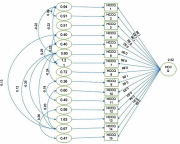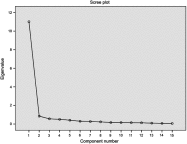Psychometric properties of the Persian Health Care Climate Questionnaire (HCCQ-P): assessment of type 2 diabetes care supportiveness in Iran
- PMID: 31190760
- PMCID: PMC6529674
- DOI: 10.2147/PPA.S201400
Psychometric properties of the Persian Health Care Climate Questionnaire (HCCQ-P): assessment of type 2 diabetes care supportiveness in Iran
Abstract
Background: Health-care systems play a key role in responding to the growing problems of patients with type 2 diabetes by supporting their autonomy in providing routine care. The Health Care Climate Questionnaire (HCCQ) was designed to assess patients' perceived degree of autonomy support within the care practice settings. The main purpose of this study was to translate and evaluate psychometric properties of the Persian version of the HCCQ (HCCQ-P) to be applied among Iranian and other Persian-speaking patients with type 2 diabetes. Method: Translation/back-translation procedures were carried out to prepare a preliminary draft of the HCCQ-P that was subsequently sent for face and content validity appraisal by a group of 15 health education/promotion and nursing specialists. Minor revisions were performed based on the feedback, and the content validity ratio (=0.91) and content validity index (=0.95) were within the acceptable range. The structural validity of the scale was assessed by exploratory and confirmatory factor analysis. Results: The exploratory and confirmatory factor analysis outputs (root mean square error of approximation=0.079, comparative fit index=0.976, Tucker Lewis index=0.967, standardized root mean square residual=0.022) demonstrated the proper performance and fitness statistics of the translated HCCQ in a one-dimensional model similar to the original scale. The internal consistency and reliability scores endorsed the validity of the translated measure (α=0.945, intraclass correlation coefficient=0.999, P=0.000). Conclusion: In this study, the translated HCCQ-P scale showed robust internal validity for its application in the assessment of health-care settings' supportiveness in care provision to Persian-speaking patients with type 2 diabetes. Future cross-cultural and multidisciplinary studies are recommended to investigate the applicability of the scale in different patients/cultural groups and health-care settings.
Keywords: Health Care Climate Questionnaire; supportive environment; type 2 diabetes.
Conflict of interest statement
Dr A Shaghaghi reports grants from Tabriz University of Medical Sciences, during the conduct of the study. The authors report no other conflicts of interest in this research project.
Figures


Similar articles
-
Factorial Structure and Psychometric Analysis of the Persian Version of Perceived Competence Scale for Diabetes (PCSD-P).Behav Sci (Basel). 2019 May 7;9(5):50. doi: 10.3390/bs9050050. Behav Sci (Basel). 2019. PMID: 31067721 Free PMC article.
-
Autonomy support in primary care--validation of the German version of the Health Care Climate Questionnaire.J Clin Epidemiol. 2012 Feb;65(2):206-11. doi: 10.1016/j.jclinepi.2011.06.003. Epub 2011 Sep 8. J Clin Epidemiol. 2012. PMID: 21862287
-
Cross-Cultural Adaptation and Psychometric Validation of the Interview Satisfaction Questionnaire (ISQ) to Assess Unmet Health Communication Needs of Iranian Breast Cancer Patients.Health Commun. 2024 Nov;39(12):2823-2833. doi: 10.1080/10410236.2023.2288712. Epub 2023 Dec 5. Health Commun. 2024. PMID: 38053361
-
Validation of the English and French versions of the Brief Health Care Climate Questionnaire.Health Psychol Open. 2017 Oct 2;4(2):2055102917730675. doi: 10.1177/2055102917730675. eCollection 2017 Jul-Dec. Health Psychol Open. 2017. PMID: 29379621 Free PMC article.
-
Cross-cultural adaptation and psychometric validation of the World Health Organization quality of life-old module (WHOQOL-OLD) for Persian-speaking populations.Health Qual Life Outcomes. 2020 Mar 11;18(1):67. doi: 10.1186/s12955-020-01316-0. Health Qual Life Outcomes. 2020. PMID: 32160912 Free PMC article.
Cited by
-
Health and Psychosocial Self-Care Needs in Off-Therapy Childhood Cancer: Hybrid Model Concept Analysis.Patient Prefer Adherence. 2020 May 7;14:803-815. doi: 10.2147/PPA.S246558. eCollection 2020. Patient Prefer Adherence. 2020. PMID: 32494126 Free PMC article.
-
Measurement Properties of Patient-Reported Outcome Measures for Diabetes: Systematic Review.J Med Internet Res. 2021 Aug 13;23(8):e25002. doi: 10.2196/25002. J Med Internet Res. 2021. PMID: 34397387 Free PMC article.
-
Validation of the Korean Version of the Health Care Climate Questionnaire among Cancer Survivors.Healthcare (Basel). 2024 Jan 26;12(3):323. doi: 10.3390/healthcare12030323. Healthcare (Basel). 2024. PMID: 38338208 Free PMC article.
-
Lifestyle modification intervention among pregnant women with hypertension based on the self-determination theory using M-Health.Front Public Health. 2025 Jun 2;13:1495281. doi: 10.3389/fpubh.2025.1495281. eCollection 2025. Front Public Health. 2025. PMID: 40524762 Free PMC article. Clinical Trial.
References
LinkOut - more resources
Full Text Sources

